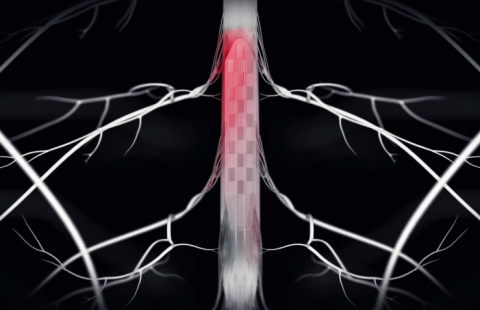(c) Fotolia
A study published in the journal Scientific Reports from Nature publishing group, describes the mechanism by which caffeine counteracts age-related cognitive deficits in animals.
The study coordinated by Portuguese researchers from Instituto de Medicina Molecular (iMM Lisboa) and collaborators from Inserm in Lille, France, along with teams from Germany and United States, showed that the abnormalexpression of a particular receptor – the adenosine A2A, target for caffeine – in the brain of rats induces an aging-like profile namely memory impairments linked to the loss of stress controlling mechanisms.
“This is part of a larger study initiated 4 years ago in which we identified the role of this receptor in stress, but we did not know whether its activation would be sufficient to trigger all the changes. We now found that by altering the amount of this receptor alone in neurons from hippocampus and cortex – memory related areas – is sufficient to induce a profile that we designate as ‘early-aging’ combining the memory loss and an increase in stress hormones in plasma (cortisol)” – explains Luisa Lopes, Group Leader at iMM Lisboa and the coordinator of the study.
When the same animals were treated with a caffeine analogue, which blocks the action of adenosine A2A receptors, both memory and stress related deficits were normalized.
David Blum, from Inserm research director, adds:
“In elderly people, we know there is an increase of stress hormones that have an impact on memory. Our work supports the view that the procognitive effects of A2AR antagonists, namely caffeine, observed in Alzheimer’s and age-related cognitive impairments may rely on this ability to counteract the loss of stress controlling mechanisms that occurs upon aging”
This is important not only to understand the fundamental changes that occur upon aging, but it also identifies the dysfunctions of the adenosine A2A receptor as a key player in triggering these changes. And a very appealing therapeutic target” – concludes Luisa Lopes.
About Luísa Lopes
Luísa V. Lopes is a Group leader@iMM Lisboa, Portugal since 2013. Luisa graduated in Lisbon in 1998 in Biochemistry and then pursued a PhD in Neurosciences being trained in the University of Cambridge, UK and at the Karolinska Institute, Sweden. Her current work focuses on understanding the mechanisms inducing the “early-aging” of the cognitive function. The team has provided evidence for an important contribution of adenosine receptors in pathophysiological context, and their impact in noxious brain conditions such as stress, aging and neurodegeneration. Her team provided crucial evidence of a possible glucocorticoid-adenosine link in Alzheimer’s disease (with D. Blum) following previous groundwork suggesting circadian disorders as a trigger for accelerated cognitive loss.
About David Blum
David Blum is Inserm Research Director at UMR-S 1172 Inserm/Université Lille2/CHRU Lille in the laboratory “Alzheimer & Tauopathies” headed by Dr. Luc Buée. David graduated in Strasbourg University and got his PhD at Inserm in Grenoble. Current work of David Blum focus on the understanding of the role of caffeine and adenosine receptors in cognitive disorders, particularly Alzheimer’s Disease. In this field, the laboratory has recently provided evidence, with the group of Luisa Lopes, that A2A receptors are important for the development of AD-like Tau pathology. Our current work is interested on the instrumental role of sub-population of A2A receptors in the brain on the occurence of cognitive disorders in neurological disorders.
About iMM Lisboa
Instituto de Medicina Molecular (iMM Lisboa) is a reference biomedical research centre in Portugal, having acquired the special status of Associate Laboratory of the Portuguese Ministry of Science and Technology. iMM’s mission is to promote basic, translational and clinical biomedical research, with the aim of understanding the mechanisms of disease and developing new therapeutic approaches.
For more information please visit the iMM Lisboa’s website: www.imm.medicina.ulisboa.pt
“Alzheimer & Tauopahies” laboratory at UMR-S 1172 Inserm/Université Lille 2/CHRU-Lille is a world class research laboratory interested in the molecular, cellular, and physiological aspects of Alzheimer’s Disease and dementia. The lab is part of the LabEx DISTALZ (national consortium on AD) and of the LICEND excellence centre for neurodegenerative diseases.


